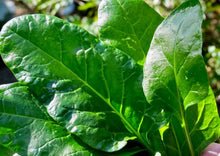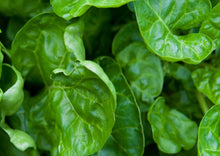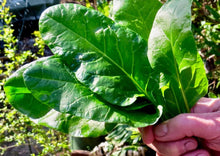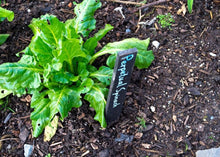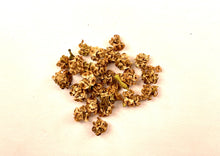
Are you tired of having your chard bolt in hot weather and last for only one season? Us too! Perma Chard to the rescue! This variety tastes like a delicious cross between chard and spinach, with a tender, nice mouth-feel. It can handle summer heat no problem and is quite cold-tolerant. We've heard that it can be grown as a perennial down to zone 5 with lots of mulch. (Beta vulgaris var cicla)
Why We Love It
Here are some of the reasons why we love Perma Chard...
1. TONS OF GREENS! - We grow tons of these delicious greens in the understory of our perennial collards. They grow close to the ground and the collards reach above them. Double the greens in the same amount of space!
2. VERY TENDER - One of the challenges with perennial veggies is that many of them are a little tougher than annual vegetables. Not so with Perma Chard. It's soft and melts in your mouth.
3. HEAT TOLERANT - One of the biggest challenges of growing annual chard is that it immediately bolts once it starts to get hot out. Perma Chard will handle the summer heat just fine.
How to Grow It
Here's how to grow Perma Chard:
| SUN | FULL SUN TO SHADE |
| MOISTURE | AVERAGE; WELL DRAINED SOILS |
| GROWING ZONES | USDA 7-9 perennial, annual everywhere else (Not sure? Find your growing zone here) |
| SIZE | 12" TALL & WIDE |
| PRO TIP |
Soak seeds overnight in water before planting to ensure strong germination. If you want them to grow them as a perennial, cut off the flower stalks and keep them well mulched. Winter Sowing is the easiest way to start these seeds. Here's a seed-starting tutorial for you. You won't believe how easy it is! |
How to Harvest & Use It
Harvest the outer most leaves from the base on a regular basis to keep plants productive. You can use these tender leaves raw or cooked wherever you'd normally use chard or spinach. Here are 17 recipes from Martha Stewart that feature chard.





